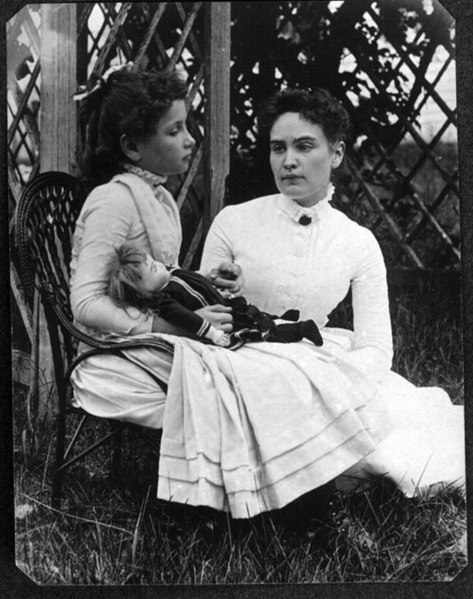 |
| Helen Keller with her tutor, Anne Sullivan, 1888 |
up without language of any kind. She behaved savagely, grunting and screaming and grabbing fistfuls of other people's food with animalistic instinct, until her tutor, Anne Sullivan, taught her to behave, but more importantly, how to use sign language. When Keller finally understood the connection between the objects and the signs for them that her teacher showed her, she had a revelation. And from there, she was able to progress and grow and become an inspiration for many.
After the film, I remember wondering how someone who is blind and deaf--someone who has never been exposed to language--would form thoughts in their mind. Would it just be a haze of fleeting instincts and flashes of tactical perception? I couldn't imagine trying to think without the essential element of language.
In Ayn Rand's Anthem, Equality 7-2521 also recognizes the limitations of thought and language. As he ponders on his own language, knowing that certain words have been willfully eradicated, he wonders:
The words of the Evil Ones . . . The words of the Unmentionable Times . . . What are the words which we have lost?
Have you ever struggled to describe a concept, even as a fluent speaker of your native tongue? There are several known examples of words that don't exist in English but exist in other languages (this source names only a few). How many more are there? Are there concepts for which the word does not exist in any language?
What do you guys think? I'm going to circulate these questions among some fellow English majors here at BYU, as well as Linguistics majors/enthusiasts as well.

I think you're absolutely right. I have often struggled with how limited the English language is. The best example I can think of is the word "love." We use the same word to say "I love hot dogs," "I love my sister," and "I love you," to our sweetheart. There are so many different kinds of "love!" We have adjectives that can somewhat help, like "filial love" (brotherly love), or you could use "parental love," etc. "Tough love," is one of my favorites, but we are still using the same word. I often find myself struggling to explain a concept in my mind through words. Many times there are no words for it. I have never read Ayn Rand's Anthem, but I can only imagine how much more difficult it would be to speak when even MORE words are eradicated!
ReplyDelete